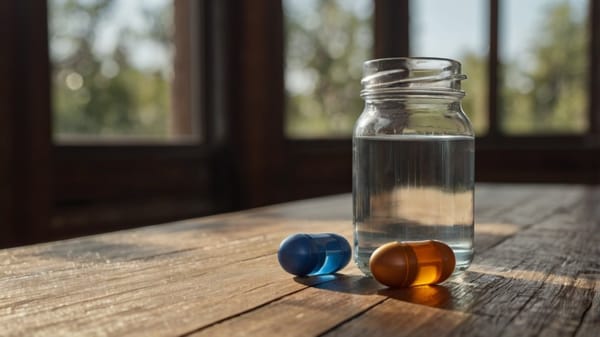What to Take Before Meals If You Want to Digest Better
Feel bloated or heavy after meals? Learn what to take before eating to support better digestion, lighter energy, and smoother gut flow.

Does eating a normal meal leave you feeling bloated, heavy, or just off? You might think the problem lies with the food—but the real issue often starts before you even take a bite. Digestion isn’t automatic.
Your body needs cues to gear up, and when it doesn’t get them, things slow down fast. With the right pre-meal habits and supplements, you can kickstart digestion and finally stop feeling weighed down after meals.
Why Pre-Meal Prep Matters for Digestion
You don’t need a full gut reset or complicated supplement routine to feel better after meals. You just need to support the steps your body’s already trying to take—especially right before eating.
When your body anticipates food, it starts producing the acid, bile, and enzymes needed to break it all down.
But thanks to modern habits like rushing meals, eating distracted, or relying on ultra-processed foods, this natural process often gets skipped or slowed down.
And when that happens? Food doesn’t break down fully. That leads to fermentation, gas, bloating, nutrient loss, and inconsistent energy.
The good news: adding a few targeted supplements—or even simple rituals—before meals can reboot that rhythm and bring your digestion back online.
The Digestive System Needs a Wake-Up Call
Before you chew your first bite, your body should already be in “go mode.” Your stomach should be acidic. Your pancreas should be ready to release enzymes. Your gallbladder should be gearing up to release bile.
When that chain reaction doesn’t happen, digestion lags—and it shows. A few smart choices before meals can flip that switch and get your system back on track.

Start With Digestive Bitters or Apple Cider Vinegar
If you want a dead-simple way to boost digestion, this is it.
Digestive bitters are herbal tinctures that stimulate the bitter taste receptors on your tongue—this sends a signal through the vagus nerve to start acid and enzyme production. It's your body's natural version of "preheating the oven."
Don’t have bitters? Apple cider vinegar (ACV) is another go-to. Just a tablespoon in a bit of warm water, taken 10–15 minutes before eating, can help acidify your stomach and prep the digestive system to break down food efficiently.
Both work because they mimic what used to happen naturally—back when we ate bitter greens and chewed more consciously. Best for: bloating, belching, and meals that leave you feeling "stuck."
Digestive Enzymes: The Assist Your Gut Might Be Missing
Your body naturally produces digestive enzymes—but sometimes, it can’t keep up with what you’re eating. Heavy proteins, fats, or complex carbs can sit undigested for too long, triggering discomfort.
Taking a broad-spectrum digestive enzyme supplement right before eating helps your gut break down those tougher components quickly, so nutrients get absorbed instead of lingering.
Look for a mix that includes protease (for protein), lipase (for fats), and amylase (for carbs). Some blends even include lactase (for dairy) and cellulase (for fiber-heavy meals).
You’ll especially notice the difference if you eat on the go, during stress, or after periods of inconsistent eating. Best for: large meals, animal proteins, or bloating that shows up 30–90 minutes after eating.
HCl with Pepsin: When Your Stomach Acid Is Too Weak
Here’s something most people don’t realize: low stomach acid—not high—is one of the most common causes of bloating, gas, and food that feels like it just sits in your gut.
Stomach acid isn’t the enemy. You need it to:
- Break down protein
- Activate enzymes
- Kill off bad bacteria
- Trigger bile flow
If your acid is too low (common with stress, aging, or low-protein diets), food can ferment in your gut instead of getting digested. The result? Burping, gas, and feeling way too full for way too long.
Betaine HCl with pepsin, taken right before eating, helps restore the acid balance and improve protein digestion.
You’ll especially benefit if you feel tired or bloated after high-protein meals. Best for: “heavy stomach” feeling, meat-heavy meals, or burping after food.
Why Magnesium Belongs on This List
While not directly digestive, magnesium plays a quiet but crucial role in motility—how smoothly food moves through your digestive tract.
Magnesium helps relax intestinal muscles, reduce tension, and support regular bowel movements.
Taking a small dose of magnesium glycinate or citrate before your dinner can set the stage for easier digestion overnight and smoother mornings.
It also helps if you carry tension in your belly (which a lot of people do without realizing it). Best for: evening meals, constipation, or gut tension from stress.
A Small Glass of Water—But Don’t Drown Your Stomach
Hydration plays a big role in digestion, but timing matters. Too much water right before or during meals can dilute stomach acid. Too little, and the digestive system runs dry.
The sweet spot? Drink a small glass of room temperature water about 15–20 minutes before you eat. This supports enzyme and acid production without watering things down.
Skip ice water—it constricts blood flow and slows digestion. Warm or room-temp water works best. Best for: dry mouth, sluggish digestion, or meals with fiber and protein.
Pre-Meal Rituals Matter, Too
Supplements are powerful—but they work even better when paired with small rituals that cue your body to shift into “digest” mode:
- Smell your food before eating
- Take 3 deep breaths to calm your nervous system
- Sit down and slow down—even if just for 10 minutes
These might sound basic, but they flip your body into parasympathetic mode (a.k.a. “rest and digest”)—the exact state your system needs to break down food smoothly.
Your Beginner-Friendly Pre-Meal Stack
Here’s a simple stack to keep digestion smooth—without overthinking it:
- Digestive bitters or ACV – 10–15 min before food
- Digestive enzyme blend – right before eating
- HCl with pepsin – if eating meat or heavier meals
- Magnesium glycinate – before dinner for gut relaxation
- Small glass of room-temp water – 20 min pre-meal
Not all meals need the full stack. Start with one or two that fit your needs and build from there. You’ll know it’s working when your gut feels lighter, your meals feel more satisfying, and your post-meal crash disappears.
Final Thoughts
You don’t have to overhaul your diet or memorize complicated supplement protocols to feel better after eating.
Just give your body the tools it needs before the first bite. Whether that’s a splash of vinegar, an enzyme capsule, or a breath before chewing—it all adds up.
Start now. Try one pre-meal habit or supplement today and pay attention to how your gut feels after. Small changes lead to real shifts—meal by meal.




